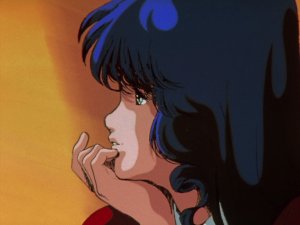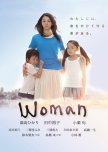Keenly realistic, Woman illustrates the hardships of widow and single mother Aoyagi Koharu. This drama qualifies as slice of life, and as such, adopts gentle pacing; but the emotional weight exuded by the story line is no joke. Though I would dub this a must-watch of 2013, empathetic viewers should proceed carefully. Even the softer scenes, such as those sweet interactions between Koharu and her children, only serve to intensify the powerful emotional effect. For my part, much of the eleven episode duration was spent biting back tears. That said, Woman may be a painful experience for some, but ultimately still an enriching and beautiful one.
Despite flirtation with the idea of what it means to be a woman, core themes center around poverty, motherhood, and family (fractured and/or 'whole'). Many will find parallels with real life, uncanny sparks of the every day between each character interaction or plot motion. Though the story can be depressing, sometimes unrelentingly so, rays of hope peek through from unlikely places. The slow pace also works well, allowing for quiet sequences and subtle explosions to be worked in without unevenness. Unfortunately, well written as I found it, there were times an event or character seemed superfluous. A glaring example of this would be the welfare worker and his wife. Their tale felt unimportant and tacked on, the purpose served more thematic than necessary -- and even then, other characters had already fulfilled this aspect well. The Shiori character was perhaps a bit underdeveloped in the end, but her place in the plot was decidedly important.
Where have they been hiding Mitsushima Hikari? If the rest of her work is as vibrant as her portrayal of Koharu, it wouldn't be far-fetched to name her among the best actresses in Japan. Mitsushima-san delivers lines as if they were second nature; her gestures and body language are subtle and real. She positively carries this drama, though her work brought up the performances of others as well. The young ones depicting the Aoyagi children are also an absolute joy to watch. More than just precocious cuties paid to be tiny versions of adults, each of them felt like actual children. They babbled and asked questions endlessly, they cried without reason, they understood more and less than adults might want. This was especially true of Suzuki Rio, as the older Nozomi.
Fans of Oguri Shun should be happy with his solid performance, but will not want to watch Woman primarily for his sake. Shun-san is primarily seen through flashbacks, and though his character is important enough to warrant a spot as a main character, it is in the same way as a literary character might be labelled as such. The absence of his Shin is what pushes the basic conflict. There is a particular scene including him which had me bawling, though.
Musically, the drama stands strong. Orchestrations felt well-placed, especially in those scenes meant to be pivotal. These are also marked by unusual but interesting cinematographic sequences, such as an intense slow motion bit, set to an older song called "Believe." These instances were a little disconnected from the rest of the drama, but strangely effective. Though the sound of the theme song ("Voice" by androp) does not initially appear suitable, the lyrics tell another tale.
Was this review helpful to you?























